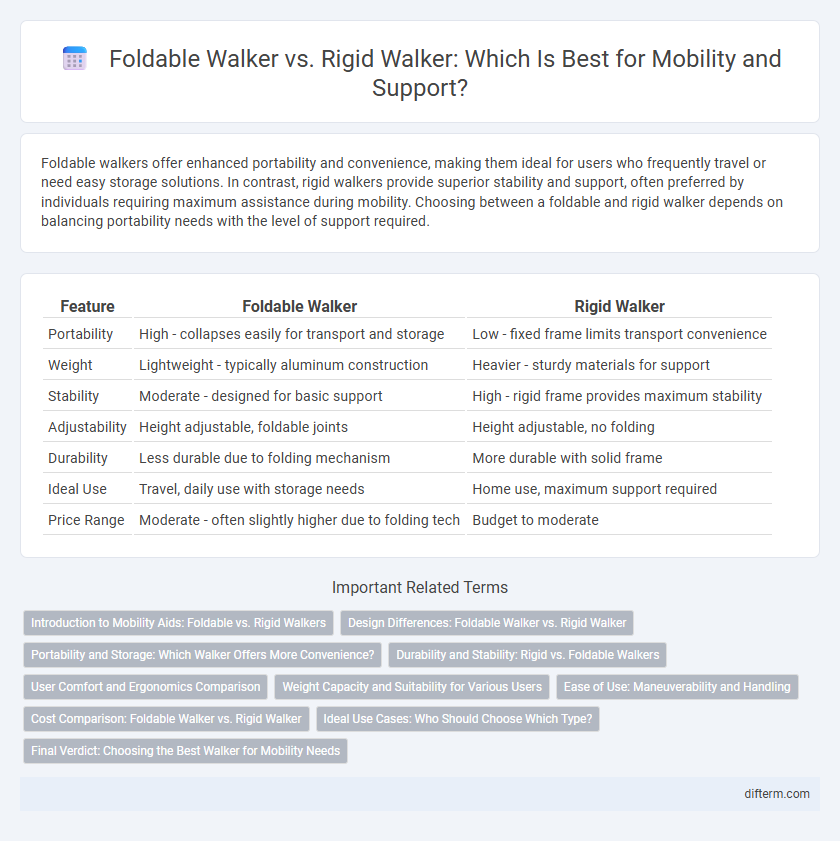Foldable walkers offer enhanced portability and convenience, making them ideal for users who frequently travel or need easy storage solutions. In contrast, rigid walkers provide superior stability and support, often preferred by individuals requiring maximum assistance during mobility. Choosing between a foldable and rigid walker depends on balancing portability needs with the level of support required.
Table of Comparison
| Feature | Foldable Walker | Rigid Walker |
|---|---|---|
| Portability | High - collapses easily for transport and storage | Low - fixed frame limits transport convenience |
| Weight | Lightweight - typically aluminum construction | Heavier - sturdy materials for support |
| Stability | Moderate - designed for basic support | High - rigid frame provides maximum stability |
| Adjustability | Height adjustable, foldable joints | Height adjustable, no folding |
| Durability | Less durable due to folding mechanism | More durable with solid frame |
| Ideal Use | Travel, daily use with storage needs | Home use, maximum support required |
| Price Range | Moderate - often slightly higher due to folding tech | Budget to moderate |
Introduction to Mobility Aids: Foldable vs. Rigid Walkers
Foldable walkers offer enhanced portability and convenient storage, ideal for users needing mobility assistance on the go. Rigid walkers provide superior stability and durability, preferred for individuals requiring robust support during daily activities. Selecting between foldable and rigid walkers depends on balancing ease of transport with the level of support needed for safe mobility.
Design Differences: Foldable Walker vs. Rigid Walker
Foldable walkers feature hinges and locking mechanisms allowing compact folding for easy storage and transport, while rigid walkers maintain a fixed frame offering enhanced stability and support. Materials for foldable walkers are often lightweight aluminum to facilitate portability, whereas rigid walkers use sturdier, heavier metals to maximize durability. Design variations impact user convenience, with foldable walkers preferred for travel and small spaces, and rigid walkers favored for maximum balance and weight-bearing assistance.
Portability and Storage: Which Walker Offers More Convenience?
Foldable walkers provide superior portability and storage convenience due to their ability to collapse into a compact size, making them ideal for travel and tight spaces. Rigid walkers, while often more stable, lack the flexibility to fold, resulting in bulkier and less convenient transport and storage. Users prioritizing ease of mobility and space-saving features typically prefer foldable models for their lightweight design and compact foldability.
Durability and Stability: Rigid vs. Foldable Walkers
Rigid walkers offer superior durability due to their solid frame construction, which withstands heavy usage and provides consistent stability on various terrains. Foldable walkers, while convenient for portability and storage, often sacrifice some degree of sturdiness, making them less reliable for users requiring maximum support. Choosing between the two depends on the balance between mobility needs and the demand for long-lasting, stable assistance.
User Comfort and Ergonomics Comparison
Foldable walkers offer enhanced user comfort through adjustable height settings and lightweight designs, promoting ease of transport and storage without compromising stability. Rigid walkers provide superior ergonomic support with fixed frames that ensure consistent posture alignment and weight distribution for users requiring maximum stability. Comparative studies indicate foldable walkers prioritize convenience, while rigid models excel in maintaining optimal user biomechanics during extended use.
Weight Capacity and Suitability for Various Users
Foldable walkers typically feature weight capacities ranging from 250 to 300 pounds, accommodating a wide variety of users while offering enhanced portability for those with active lifestyles. Rigid walkers often support higher weight capacities, up to 400 pounds, making them suitable for heavier individuals requiring maximum stability and durability. The choice between foldable and rigid walkers depends on balancing weight support needs with user convenience and mobility demands.
Ease of Use: Maneuverability and Handling
Foldable walkers offer enhanced maneuverability by easily adapting to tight spaces and providing compact storage, making them ideal for users who need portability and frequent adjustments. Rigid walkers, while sturdier, tend to be bulkier and less agile, which may challenge users when navigating crowded or confined areas. The lightweight design of foldable walkers generally improves handling, allowing smoother movement and greater user independence.
Cost Comparison: Foldable Walker vs. Rigid Walker
Foldable walkers generally cost more than rigid walkers due to their complex design and added convenience features. Rigid walkers are typically more affordable, with prices ranging lower while offering stable support without folding mechanisms. When considering overall value, foldable walkers may justify the higher cost for users needing portability and easy storage.
Ideal Use Cases: Who Should Choose Which Type?
Foldable walkers are ideal for seniors and individuals with limited storage space or those who frequently travel, offering convenience and portability. Rigid walkers provide greater stability and support, making them suitable for users with severe mobility impairments or who require a sturdy frame for balance. Choosing between foldable and rigid walkers depends on balancing portability needs with the level of required support and stability.
Final Verdict: Choosing the Best Walker for Mobility Needs
Foldable walkers offer enhanced portability and convenience, making them ideal for individuals who require easy storage and transport, while rigid walkers provide superior stability and support for those with significant mobility challenges. The choice between foldable and rigid walkers ultimately depends on the user's lifestyle, balance requirements, and frequency of use. Prioritizing personal mobility goals and safety ensures selecting the best walker that promotes independence and confidence.
foldable walker vs rigid walker Infographic

 difterm.com
difterm.com